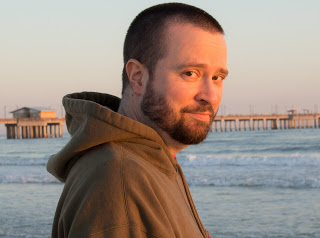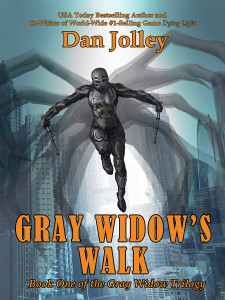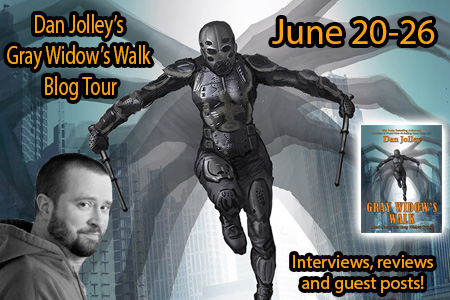Crossed any good genres recently?
Today I'm delighted to welcome Dan Jolley, author of Gray Widow's Walk, to my blog. He's known for comic books, video-games and more, and Gray Widow sounds like the perfect blend of superhero and haunting protagonist... or cross-genre, horror, scifi, cool, intriguing... Yeah, so what genre is it really, Dan?
THE CROSS-GENRE
QUESTION
Dan Jolley
I knew, when Stephen Zimmer at Seventh Star Press agreed to
publish my new novel, Gray Widow’s Walk,
that categorizing it might present a problem.
People, humans in general, love to categorize
things—animals, plants, food, cars, each other, themselves. One of the things I
learned when I took a class on horror movies in college was that, when
something crosses from one category into another, it makes people
uncomfortable. That’s just a built-in psychological feature of most sentient
minds. Zombies: are they alive or dead? That freaks me out! Werewolves: are
they human or animals? I’m scared!
(I’m afraid that that mental tic may be why people who don’t
conform to binary gender roles have been wrongly persecuted and demonized
for…well, for as long as there have been societies. “That person has qualities
that I consider both male and female! Aaaaargh!”)
Gray Widow’s Walk
focuses on Janey Sinclair, a young woman whose life has been hell. She lost her
mother to cancer at age nine, watched her father get shot—and was shot herself
and left for dead—at age sixteen, and lost her husband in a devastating way
when she was twenty-five. Janey makes her living as a fine artist, has never
felt as if she fit in anywhere, and would probably have settled into a life of
relative isolation…
…if she hadn’t mysteriously developed the ability to
teleport from one patch of darkness to another. Given that power, Janey
realizes she has an outlet for all the repressed rage she’s built up over many,
many years, and decides to take it out on the criminal element of Atlanta,
Georgia. She can’t right the wrongs done to her, but she can sure as hell
prevent as many injustices as possible from happening to other people.
Knowing that her newfound endeavor will be intensely
dangerous, and not wanting to get shot or stabbed to death, Janey steals a suit
of prototype military body armor. This protects her, but the helmet/mask also
conceals her identity, so that when what she’s doing goes public—and it goes public
immediately, courtesy of social media—the
press ends up calling her “the Gray Widow.”
Now, if that were all the story involved, I probably
could’ve just called the book “superhero fiction” and been done with it. But
it’s not. Janey soon encounters a young runaway named Simon Grove who, unknown
to either of them, has been changed by the same mysterious force that gave
Janey her teleportation ability. Simon’s alterations have turned out a great
deal more chaotic than hers, though,
twisting his body in ways that mirror his damaged mind, and while Janey uses
her “augmentation” to pursue the righting of wrongs, Simon’s bloodthirsty,
homicidal nature combines with his new ability to take him over.
If I’ve done my job right, most of the scenes involving Simon
fall squarely into the “horror” category.
So now it’s a superhero/horror book? I guess?
But there’s also a relationship story in there—a “love
story,” if you will, that begins when Janey meets a guy named Tim Kapoor and,
for the first time in years, sees a chance to connect with someone. That’s a
torturous prospect, though, because of the way she lost her husband, and Janey
basically goes to war with herself over the possibility of letting herself be
genuinely happy.
I wouldn’t call that part of the story “romance,” exactly, at
least not of the Harlequin variety, but it’s there, and it’s vital to Janey’s
character. So where does that leave the categorization now?
(A side note: when I was telling my manager what the book
was about, I was up-front that it was cross-genre, and that that presented its
own obstacles to publication. He said, “Why would you write it that way if you
knew it was going to make it harder to publish?” I said, “Because this was the
story I wanted to tell.” He said, “God,
you’re such an artist.”)
If I had my way, I’d call the whole thing “science-fiction.”
The vast majority of superheroes fall squarely into the
science-fiction category anyway. A billionaire who invents a new kind of energy
source and uses it to power a suit of armor that turns him into a flying tank?
Science-fiction. An alien rocketed to Earth, where the rays of the yellow sun
affect his extraterrestrial physiology and give him amazing abilities?
Science-fiction. A guy receives a ring that creates physical manifestations of
his imagination from an alien corps of intergalactic law enforcement officers? Totally science-fiction. (And taken
largely from E.E. “Doc” Smith’s seminal Lensman
series.)
Not only that, but a lot of science-fiction characters
qualify as superheroes. Steve Austin in The
Six Million Dollar Man? Unquestionably a superhero. Felix, in John
Steakley’s Armor? Put him on Earth by
himself and he’d fit the bill perfectly. Gil Hamilton, in Larry Niven’s The Long A.R.M. of Gil Hamilton? Not
only is he a superhero, he’s one that I would give a pinky toe to be able to
adapt into a feature film.
Okay, but what about the horror aspects revolving around
Simon Grove? I direct you to Alien.
Or Event Horizon. Or John Carpenter’s
The Thing. There are many aspects of
science-fiction that lend themselves to, and often lead directly to, horror. Stephen
King’s short story “The Jaunt” is a good example of that. Read at your own risk,
if you haven’t already.
As far as the love story, romantic relationships go
hand-in-hand, have always gone
hand-in-hand with science-fiction. Leia and Han in Star Wars. Kyle Reese’s longing for Sarah Connor (or, one could
argue, the idea of Sarah Connor) in The
Terminator. Hell, Frankenstein
would’ve been a very different story if the good doctor hadn’t loved his wife.
BUT…people see Gray
Widow’s Walk, and they understand that it involves someone wearing an
identity-concealing “costume,” acting as a vigilante and possessing superhuman
abilities, and they don’t think “science-fiction.” They think “superhero,” and
as I’ve recently come to find out, a lot of people concretely equate anything
superhero with material aimed at children.
Believe me, folks, please—Gray Widow’s Walk is not for kids.
So what do I call it? Do I give it a big mish-mash of
descriptors, such as “sci-fi/action/superhero?” Do I try to tie in to a popular
genre, and call it urban fantasy? I guess it could sort of fit, but not
completely. Do I stick to my guns and call it “science-fiction,” even though to
most people that means space ships and laser guns?
I’d love to just tell people, “It’s a really good story, I’m
incredibly proud of it, just give it a chance and see if it grabs you.” But I
can’t do that, at least not on an official, public scale. So I think the best
label, if it has to have one, is probably “superhero noir.”
I hope you give it a look, and decide for yourself.
(Also, please feel free to bug me about it on Twitter. I’m
@_DanJolley.)
Dan Jolley's Gray Widow's Walk Blog Tour
June 20-26, 2016
 About the author: Dan Jolley started writing professionally at age nineteen. Beginning in comic books, he has since branched out into original novels, licensed-property novels, children’s books, and video games. His twenty-five-year career includes the YA sci-fi/espionage trilogy Alex Unlimited; the award-winning comic book mini-series Obergeist; the Eisner Award-nominated comic book mini-series JSA: The Liberty Files; and the Transformers video games War for Cybertron and Fall of Cybertron. Dan was co-writer of the world-wide-bestselling zombie/parkour game Dying Light, and lead writer of the Oculus Rift game Chronos. Dan lives somewhere in the northwest Georgia foothills with his wife Tracy and a handful of largely inert cats. Gray Widow’s Walk is his first adult novel.
About the author: Dan Jolley started writing professionally at age nineteen. Beginning in comic books, he has since branched out into original novels, licensed-property novels, children’s books, and video games. His twenty-five-year career includes the YA sci-fi/espionage trilogy Alex Unlimited; the award-winning comic book mini-series Obergeist; the Eisner Award-nominated comic book mini-series JSA: The Liberty Files; and the Transformers video games War for Cybertron and Fall of Cybertron. Dan was co-writer of the world-wide-bestselling zombie/parkour game Dying Light, and lead writer of the Oculus Rift game Chronos. Dan lives somewhere in the northwest Georgia foothills with his wife Tracy and a handful of largely inert cats. Gray Widow’s Walk is his first adult novel.
Meet the Author:
Website:
www.danjolley.com
Twitter: @_DanJolley
 About the book: Gray Widow’s Walk: “The only thing in this world you can truly control is yourself.”
About the book: Gray Widow’s Walk: “The only thing in this world you can truly control is yourself.”
Janey Sinclair’s ability to teleport has always been a mystery to her. She tried for years to ignore it, but when tragedy shatters her life, Janey’s anger consumes her. She hones her fighting skills, steals a prototype suit of military body armor, and takes to the streets of Atlanta, venting her rage as the masked vigilante dubbed “the Gray Widow” by the press.
But Janey’s power, and her willingness to use it, plunges her into a conflict on a much grander scale than she had anticipated.
Soon she encounters Simon Grove, a bloodthirsty runaway with a shapeshifting ability gone horribly wrong…
Garrison Vessler, an ex-FBI agent and current private defense contractor, who holds some of the answers Janey’s been searching for…
And Tim Kapoor, the first person in years with a chance of breaking through Janey’s emotional shell—if she’ll let him.
But as Janey’s vigilantism gains worldwide attention, and her showdown with Simon Grove draws ever closer, the reason for her augmented abilities—hers and all the others like her—begins to reveal itself. Because, high above the Earth, other eyes are watching. And they have far-reaching plans…
Gray Widow’s Walk is book one of the Gray Widow Trilogy, to be followed by Gray Widow’s Web and Gray Widow’s War.
Read the Book:
Amazon Print Version
https://www.amazon.com/Gray-Widows-Walk-Dan-Jolley/dp/1941706398
Kindle Version
https://www.amazon.com/Gray-Widows-Walk-Widow-Trilogy-ebook/dp/B01F3ZPTAW
Barnes and Noble Link for Gray Widow’s Walk
http://www.barnesandnoble.com/w/gray-widows-walk-dan-jolley/1123793587?ean=2940158215902
Find out more: Follow the Tour
6/20/2016 MyLifeMyBooksMyEscape Interview
6/20/2016 Beauty in Ruins Guest Post
6/21/2016 SpecMusicMuse Interview
6/22/2016 The Word Nerds Guest Post
6/22/2016 I Smell Sheep Interview
6/22/2016 Cover2Cover Top Ten’s List
6/23/2016 Sheila's Guests and Reviews Guest Post
6/24/2016 Deal Sharing Aunt Interview
6/24/2016 Infamous Scribbler Interview
6/25/2016 Jordan Hirsch Review
6/26/2016 Jorie Loves a Story Review/Interview
6/26/2016 Swilliblog Review

Comments